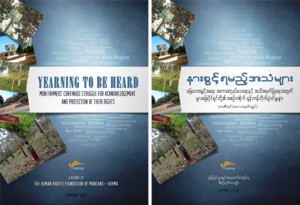HURFOM releases “Yearning to be Heard”, highlighting farmers’ continued struggles for justice concerning Burmese military land confiscations in Mon State
February 12, 2015
On 12 February 2015, The Human Rights Foundation of Monland (HURFOM) released a report entitled “Yearning to be Heard: Mon farmers’ continued struggle for acknowledgement and protection of their rights”, highlighting farmers’ continued struggles for justice concerning past and on-going Burmese military land abuses in Mon State.
 As a follow-up to HURFOM’s 2013 report “Disputed Territory”, the latest report illustrates how farmers continue to meet significant barriers to their pursuit of justice regarding military land rights violations. “Yearning to be Heard” highlights how, while farmers have now repositioned themselves, armed with information and supported by advocates, their progress remains stalled: land rights and tenancy remain insecure, properties confiscated by the military have not been returned, and farmers have not yet been justly compensated. The report reveals how relevant authorities have consistently ignored Mon farmers’ calls for justice, leaving appeal letters unanswered and the majority of cases of land conflict unresolved. [Full Report in PDF – 4242 KB] | Low resolution report – 1317 KB | Report in brief Burmese – 2654 KB]
As a follow-up to HURFOM’s 2013 report “Disputed Territory”, the latest report illustrates how farmers continue to meet significant barriers to their pursuit of justice regarding military land rights violations. “Yearning to be Heard” highlights how, while farmers have now repositioned themselves, armed with information and supported by advocates, their progress remains stalled: land rights and tenancy remain insecure, properties confiscated by the military have not been returned, and farmers have not yet been justly compensated. The report reveals how relevant authorities have consistently ignored Mon farmers’ calls for justice, leaving appeal letters unanswered and the majority of cases of land conflict unresolved. [Full Report in PDF – 4242 KB] | Low resolution report – 1317 KB | Report in brief Burmese – 2654 KB]
The report focuses in particular on farmers’ pursuit of justice in Mon State’s Thanbyuzayat Township. According to the report, details are only now beginning to emerge of almost 2,000 acres of civilian rubber plantation land confiscated in Thanbyuzayat, perpetrated by the military under the former regime.
Nai Aue Mon, coordinator of HURFOM’s Human Rights Documentation and Dissemination Program, detailed that the key purpose of this report is to advocate for Mon farmers’ land rights. Throughout the report, HURFOM contends that all land rights violations in Mon State must be adequately and independently investigated. Further to this, HURFOM advocates that deep structural change is required regarding the root causes of Burma’s land conflict, to facilitate redress for past violations and protect farmers’ land security into the future
The report urges government bodies to recognize the rights of original land owners, pay attention to farmers’ voices, immediately stop all acts of land confiscation, and curtail the impunity of Burma’s military. Nai Aue Mon explained that, as this report contends, successful democratic reform and national reconciliation within Burma will only be possible once the nation’s land conflicts have been adequately resolved.
Comments
Got something to say?
You must be logged in to post a comment.



















































